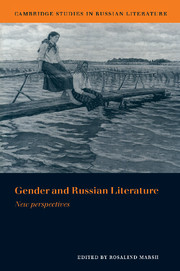Book contents
- Frontmatter
- Contents
- Notes on contributors
- Acknowledgements
- 1 Introduction: new perspectives on women and gender in Russian literature
- PART I HISTORICAL AND BIOGRAPHICAL PERSPECTIVES
- 2 Women in seventeenth-century Russian literature
- 3 Conflicts over gender and status in early nineteenth-century Russian literature: the case of Anna Bunina and her poem Padenie Faetona
- 4 Reading the future: women and fortune-telling in Russia (1770–1840)
- 5 Russian women writers of the nineteenth century
- 6 The ‘woman question’ of the 1860s, and the ambiguity of the ‘learned woman’
- 7 Carving out a career: women prose writers, 1885–1917, the biographical background
- 8 The fate of women writers in literature at the beginning of the twentieth century: ‘A. Mirè’, Anna Mar, Lidiia Zinov′eva-Annibal
- 9 Lidiia Zinov′eva-Annibal's The Singing Ass: a woman's view of men and Eros
- 10 Anastasiia Verbitskaia reconsidered
- 11 Soviet woman of the 1980s: self-portrait in poetry
- PART II THE PERSPECTIVE OF LITERARY CRITICISM
- Index
- CAMBRIDGE STUDIES IN RUSSIAN LITERATURE
11 - Soviet woman of the 1980s: self-portrait in poetry
Published online by Cambridge University Press: 06 July 2010
- Frontmatter
- Contents
- Notes on contributors
- Acknowledgements
- 1 Introduction: new perspectives on women and gender in Russian literature
- PART I HISTORICAL AND BIOGRAPHICAL PERSPECTIVES
- 2 Women in seventeenth-century Russian literature
- 3 Conflicts over gender and status in early nineteenth-century Russian literature: the case of Anna Bunina and her poem Padenie Faetona
- 4 Reading the future: women and fortune-telling in Russia (1770–1840)
- 5 Russian women writers of the nineteenth century
- 6 The ‘woman question’ of the 1860s, and the ambiguity of the ‘learned woman’
- 7 Carving out a career: women prose writers, 1885–1917, the biographical background
- 8 The fate of women writers in literature at the beginning of the twentieth century: ‘A. Mirè’, Anna Mar, Lidiia Zinov′eva-Annibal
- 9 Lidiia Zinov′eva-Annibal's The Singing Ass: a woman's view of men and Eros
- 10 Anastasiia Verbitskaia reconsidered
- 11 Soviet woman of the 1980s: self-portrait in poetry
- PART II THE PERSPECTIVE OF LITERARY CRITICISM
- Index
- CAMBRIDGE STUDIES IN RUSSIAN LITERATURE
Summary
Every work of art, of whatever type or genre, undoubtedly contains features of its creator and represents a distinctive autobiography of the creative personality. At the same time, it is no literal, mirror image of its creator, but rather a self-portrait of some lyric hero or heroine who emerges in the process of the creative act, a persona based on the artist's personality, but not totally identical with it.
The correlation between the poet's personality and the literary image which emerges while reading poetic texts always arouses the interest of literary scholars. One or another solution to this question provides the key to an analysis of the work, an elucidation of its typical or specific nature and an introduction to a definite socio-cultural context, not to mention its gender-specific attributes, a subject which arouses controversy today. An artistic self-portrait makes it possible to study not only a specific creative personality, but also the sensual, emotional and psychological aspects of a society, which are so important to its spiritual history. This is what enables us to appreciate an era from within, to explore and evaluate it not on the basis of external facts and events, but through the existential experiences and feelings of human beings.
From the works of Soviet women poets I have selected poems by Tat′iana Bek, Nina Iskrenko and Tat′iana Smertina, since, in my opinion, they represent different types of poetic heroine, with different patterns of mentality, temperament and philosophy.
- Type
- Chapter
- Information
- Gender and Russian LiteratureNew Perspectives, pp. 206 - 226Publisher: Cambridge University PressPrint publication year: 1996



